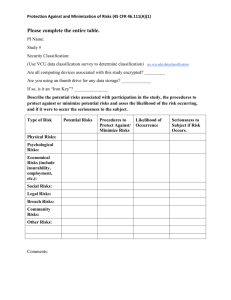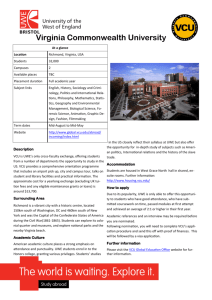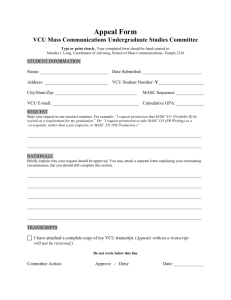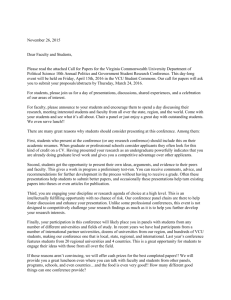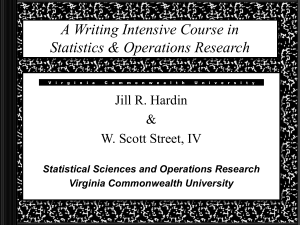click here - Ram Pages
advertisement
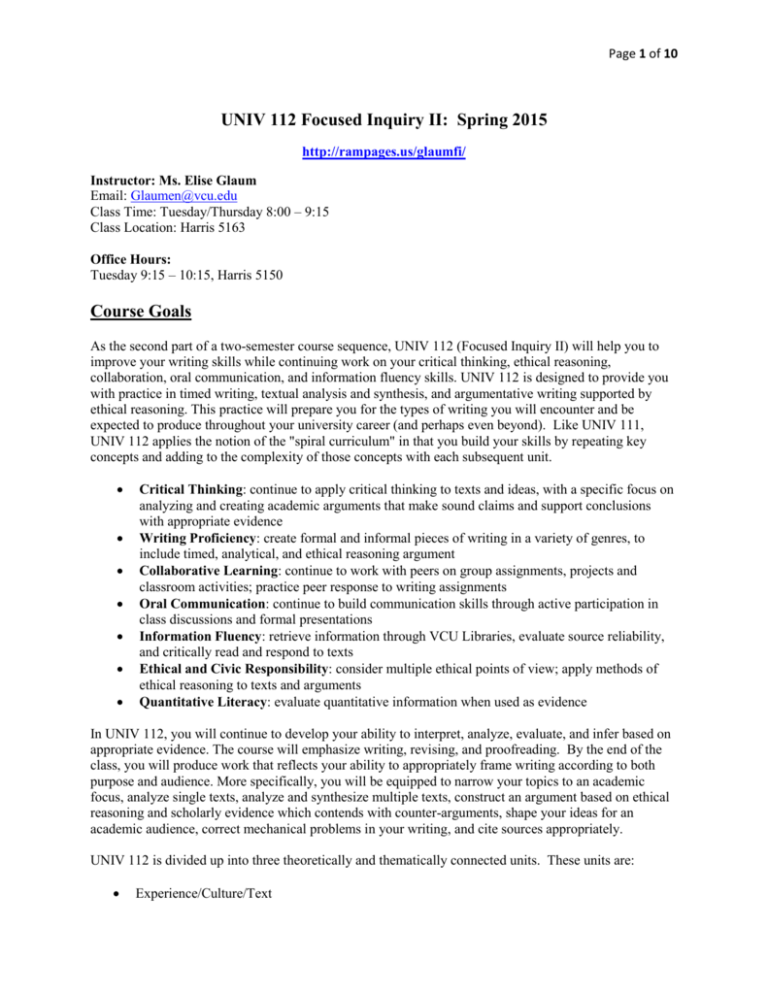
Page 1 of 10 UNIV 112 Focused Inquiry II: Spring 2015 http://rampages.us/glaumfi/ Instructor: Ms. Elise Glaum Email: Glaumen@vcu.edu Class Time: Tuesday/Thursday 8:00 – 9:15 Class Location: Harris 5163 Office Hours: Tuesday 9:15 – 10:15, Harris 5150 Course Goals As the second part of a two-semester course sequence, UNIV 112 (Focused Inquiry II) will help you to improve your writing skills while continuing work on your critical thinking, ethical reasoning, collaboration, oral communication, and information fluency skills. UNIV 112 is designed to provide you with practice in timed writing, textual analysis and synthesis, and argumentative writing supported by ethical reasoning. This practice will prepare you for the types of writing you will encounter and be expected to produce throughout your university career (and perhaps even beyond). Like UNIV 111, UNIV 112 applies the notion of the "spiral curriculum" in that you build your skills by repeating key concepts and adding to the complexity of those concepts with each subsequent unit. Critical Thinking: continue to apply critical thinking to texts and ideas, with a specific focus on analyzing and creating academic arguments that make sound claims and support conclusions with appropriate evidence Writing Proficiency: create formal and informal pieces of writing in a variety of genres, to include timed, analytical, and ethical reasoning argument Collaborative Learning: continue to work with peers on group assignments, projects and classroom activities; practice peer response to writing assignments Oral Communication: continue to build communication skills through active participation in class discussions and formal presentations Information Fluency: retrieve information through VCU Libraries, evaluate source reliability, and critically read and respond to texts Ethical and Civic Responsibility: consider multiple ethical points of view; apply methods of ethical reasoning to texts and arguments Quantitative Literacy: evaluate quantitative information when used as evidence In UNIV 112, you will continue to develop your ability to interpret, analyze, evaluate, and infer based on appropriate evidence. The course will emphasize writing, revising, and proofreading. By the end of the class, you will produce work that reflects your ability to appropriately frame writing according to both purpose and audience. More specifically, you will be equipped to narrow your topics to an academic focus, analyze single texts, analyze and synthesize multiple texts, construct an argument based on ethical reasoning and scholarly evidence which contends with counter-arguments, shape your ideas for an academic audience, correct mechanical problems in your writing, and cite sources appropriately. UNIV 112 is divided up into three theoretically and thematically connected units. These units are: Experience/Culture/Text Page 2 of 10 Text/Context Context/Argument Required Course Materials You must have all of these materials to be successful in the class. Hacker, Diana and Nancy Sommers. A Writer’s Reference, Seventh Edition with Writing in the Disciplines and Multimodal Projects Hayden McNeil Custom Reader: Evolving Ideas: Focused Inquiry, VCU 2014-2015 Edition Radioactive by Lauren Redniss (2015 Winter Reading) VCU email account/Blackboard account and reliable daily access to those accounts. Required Assignments Writing: As in UNIV 111, students will produce one major writing assignment during each of the three units of the course. Each piece of writing will be taken through a process of drafting, revision, and/or reflection, which may include preliminary drafts, guided revision, peer review, and critical selfassessment. Major writing assignments in each unit will grow out of and evidence the critical thinking and critical reading that occurs during the unit. When secondary research is involved, sources should be properly documented with in-text citations and a Works Cited page. In addition to the major writing assignments, students will also be expected to practice writing inside and outside of class through various class activities, which may include online community forums, blogs, journals, written responses inside and outside of class, peer review, emails to your instructor, and other class activities. Unit I: Students will take a timed essay exam based on the common reading and will produce reflective writing based on this exam and their performance on that exam. Unit II: Students will produce a piece of analytical writing that summarizes, analyzes, and synthesizes outside sources (minimum of 4 pages or 1000 words). Unit III: Students will produce an Ethical Reasoning Argument (5-7 pages or 1250-1750 words) Oral Communication: Each student will complete one formal (i.e. planned & rehearsed) individual presentation and one formal collaborative oral presentation. These presentations may be subject to specific parameters, such as time limits, use of audio/visual aids, delivery technique, etc. In addition to these two formal presentations, students will also regularly be asked to orally share their ideas, written work, summaries of readings or group discussions, and critical responses to readings, assignments, or class activities. Class Participation and Collaborative Work: Students will work collaboratively with their classmates throughout the semester on a variety of activities both in and out of class including oral presentations, peer review, online community forum postings, and other unit assignments. Electronic Portfolio: Over the course of the semester, students will construct an electronic portfolio of their work on Rampages, including work from the UNIV 112 course that demonstrates their strengths, weaknesses, and/or progress as a first-year student and an accompanying self-reflective assessment (written or otherwise) of their experience in the Focused Inquiry course. The electronic portfolio is an integral part of the course’s commitment to critical self-reflection and engaged learning. Students cannot exit UNIV 112 without successful completion of an electronic portfolio. Page 3 of 10 Course Grading Weight of course components in final grade: Core Assignments: 60% Major writing assignments, group and individual presentations, portfolio Other Course Work: 20% Blogging, quizzes, homework, etc. Class Attendance and Active Participation: 20% Please note: Failure to turn in an electronic learning portfolio of coursework at the end of the term will result in failure of the course. The grade is based on a standard 10-point scale: A (90-100%) B (80-89%) C (70-79%) D (60-69%) F (below 60%) Final grades are rounded up to the next whole number. (For example, 79.6 is a B, but 79.4 is a C). It is the student’s responsibility to keep up with the grades as they are posted on Blackboard. If you see a mistake, you should alert me as soon as possible. Students must earn a C or better in UNIV 112 to exit the course. Students who do not earn a C or better must repeat the course. The meaning of “sufficient time” depends on individual student ability and background, but is a minimum of five hours per week (outside of class). “Sufficient effort” means coming to class each day, doing the assignments completely and thoughtfully (and not thinking of it as busy work, to be completed as quickly and superficially as you can get away with), and communicating with me in office hours or by email whenever you are having difficulties—academic or otherwise—that keep you from completing an assignment fully or sufficiently well. It might also include regular visits to the Writing Center and/or Language Resource Center. If you are worried about your ability to achieve the grade you want in this class, please come talk to me (early and often) so that we can set a plan for your success. Course Policies Focused Inquiry Program Attendance Policy: UNIV 112 requires prepared, active participation during class sessions. While attendance is mandatory, students should not expect to do well simply by attending. Page 4 of 10 Being absent from class does not relieve students of responsibility for completing all course work by the scheduled due dates. The instructor has the right to lower a student's final course grade as the sole result of his or her repeated absences and tardiness Students who miss more than 25% of the classes will automatically fail. In a TTH class, this is 8 or more absences. There are no “excused” or “unexcused” absences. I keep and report daily attendance during an opening question each morning. Therefore, you must be on time. You will receive an automated email each time you are absent. This email is also sent to your advisor. If you receive an email in error, please let me know immediately. Participation: Students are expected to actively participate both in class and by commenting on class blogs. Participation will be assessed for a grade at the end of each unit. Cell Phone and Laptop Policy: Cell phone and laptop use can create significant distractions in an activelearning class such as ours. On most class days, you will be engaged in doing and discussing things rather than taking notes or looking things up. Therefore, unless instructed otherwise, please leave your laptops in your bag. Turn off and put away your cell phones before entering the classroom. (I understand that there are occasional times when students need to be reached by cell phone-- for instance, if you have a job that requires you to be on-call or you are a parent with a sick child. If this is the case, please notify me as you enter the room at the start of class). Cell phone and laptop use in class (unless instructed otherwise) will result in a lower class participation grade. Paper Acceptance Policy: Papers are due by the beginning of class on the due date. Late papers will lose half a letter grade for each day they are late (including weekends). If a situation arises in which you know a paper will be late, please discuss this with me at least a week before the paper is due. You will turn in most papers electronically and they will be time-stamped. During the writing process, for peer review activities, it may be necessary to bring in printed copies to class for peer review activities (this will be announced in class or on the class website in advance). All final assignments must be submitted electronically using the specified instructions on the assignment guidelines. Multiple submissions will not be accepted, so make sure to double check and proofread your submission. Occasionally, you will be asked to turn in a paper in more than one format (electronically, paper copy, for program assessment). Paper copies of final assignments will not be accepted in lieu of electronic submissions. Required format for written assignments (including homework): Written assignments should conform to the following specifications. You may need to adjust the software settings to adhere to these requirements: Times New Roman or Arial, 12 point Margins: 1 inch, left and right, top and bottom Justification: left margin only Line spacing: double-spaced Print: dark, and on one side of the page Graphics: in an appendix only Documentation: MLA style See pages 436-440 in Hacker’s A Writer’s Reference for a model. Page 5 of 10 Class Website (http://rampages.us/glaumfi/): Course documents, announcements, and assignments will be accessible through our class website. You are required to check this website on a regular basis and are completely responsible for the consequences of not reading announcements, assignments, or other posts in a timely fashion. The library has computers with Internet connections available for student use. Blackboard: Grades for this course will be posted on Blackboard. You should keep track of your grades so that you are not caught by surprise at the middle or end of the semester, and so that you can let me know right away of any discrepancies. If you have technical difficulties with our class website, Blackboard, VCU email, or your computer, it is your responsibility to resolve those difficulties through the appropriate channels in a timely manner. The technology help desk can be reached at 828-2227 or online here. Email Policy: You are expected to check your VCU email each weekday. Your VCU email is the official email address to which I will send email communications. You are responsible for the consequences of not reading, in a timely fashion. Remember to use email etiquette when sending me emails. Failure to use proper email etiquette may result in no response. (Review email etiquette here: http://sites.laverne.edu/learning-enhancement-center/files/2011/04/EMAIL_ETIQUETTE.pdf) I will do my best to respond to all emails within 24 hours M-F from 8-5. However, please keep in mind that when major assignments are due, I will get an influx of emails and may not be able to respond to your question in time. Remember to ask questions in class and come to my office hours if you need help. Please do not send me emails from a personal email address. Submission of online work: VCU students have the opportunity to narrate, curate, and share the story of their learning and achievements with the world. Universities such as Penn State, the University of Oklahoma, Emory University, and the University of Mary Washington have offered this opportunity to their students with great success, and we anticipate VCU’s experience will be just as beneficial. While we encourage you to participate in the full experience of “connected learning,” we also want you to know that you have rights and responsibilities when posting course work online: As part of this course, students must create portfolios that will be retained on platforms accessible online. The recommended platform, Rampages, allows students to control the visibility of their work (i.e., restricted to specific users, restricted to the VCU community, or publicly accessible). At a minimum, students must allow their instructor to view their work. Please consult with your instructor if you would like more information on restricting the visibility of your portfolio. Students must be in compliance with the end user licenses, platform policies, and applicable laws for any open- or protected-access sites that they choose to use in support of their work for VCU. This includes sites such as Blackboard, YouTube, Google Drive, Slideshare, or any cloud storage students choose to use. Please familiarize yourself with any user licensing agreements and applicable laws that may apply. Students have intellectual property rights to work they generate in support of their studies at VCU as described in the VCU Intellectual Property Policy. If a class project offers use of a site that requires users to waive intellectual property rights to posted content, students may utilize an alternate platform for posting or submission of their materials. Please consult with your instructor for more information. Students are responsible for the work they share online or in any manner. No group work may be posted online or used in any manner other than submission to the course instructor without full Page 6 of 10 consent of all group members. VCU policies and regulations regarding the network and resources are also applicable. University Policies E-mail Policy: Email is considered an official method for communication at VCU because it delivers information in a convenient, timely, cost-effective, and environmentally aware manner. Students are expected to check their official VCU email on a frequent and consistent basis in order to remain informed of university-related communications. The university recommends checking email daily. Students are responsible for the consequences of not reading, in a timely fashion, university-related communications sent to their official VCU student email account. This policy ensures that all students have access to this important form of communication. It ensures students can be reached through a standardized channel by faculty and other staff of the university as needed. Mail sent to the VCU email address may include notification of university-related actions, including disciplinary action. Please read the policy in its entirety. VCU Honor System - Upholding Academic Integrity: The VCU Honor System policy describes the responsibilities of students, faculty and administration in upholding academic integrity, while at the same time respecting the rights of individuals to the due process offered by administrative hearings and appeals. According to this policy, "Members of the academic community are required to conduct themselves in accordance with the highest standards of academic honesty and integrity." In addition, "All members of the VCU community are presumed to have an understanding of the VCU Honor System and are required to: Agree to be bound by the Honor System policy and its procedures; Report suspicion or knowledge of possible violations of the Honor System; Support an environment that reflects a commitment to academic integrity; Answer truthfully when called upon to do so regarding Honor System cases; Maintain confidentiality regarding specific information in Honor System cases." More information can be found at in the VCU policy library. In this class, because coursework will be at times collaborative, particular issues of integrity arise. You should not copy or print another student’s work without permission. Any material (this includes ideas and language) from another source must be credited, whether that material is quoted directly, summarized, or paraphrased. In other words, you should respect the work of others and in no way present it as your own. Student Conduct in the Classroom: According to the Faculty Guide to Student Conduct in Instructional Settings, "The university is a community of learners. Students, as well as faculty, have a responsibility for creating and maintaining an environment that supports effective instruction. In order for faculty members (including graduate teaching assistants) to provide and students to receive effective instruction in classrooms, laboratories, studios, online courses, and other learning areas, the university expects students to conduct themselves in an orderly and cooperative manner." Among other things, cell phones and beepers should be turned off while in the classroom. The Student Code of Conduct also prohibits the possession of or carrying of any weapon. For more information see here. Students with Disabilities: Section 504 of the Rehabilitation Act of 1973 and the Americans with Disabilities Act of 1990, as amended, require that VCU provide "academic adjustments" or "reasonable accommodations" to any student who has a physical or mental impairment that substantially limits a Page 7 of 10 major life activity. To receive accommodations, students must request them by contacting the Disability Support Services Office on the Monroe Park Campus (828-2253) or the Division for Academic Success on the MCV campus (828-9782). Please also visit the Disability Support Services website and/or the Division for Academic Success website for additional information. Any student who has a disability that requires an accommodation should schedule a meeting with the instructor at the student's earliest convenience. Additionally, if coursework requires the student to work in a lab environment, the student should advise the instructor or a department chairperson of any concerns that the student may have regarding safety issues related to a disability. Students should follow this procedure for all courses in the academic semester. Statement on Military Short-Term Training or Deployment: If military students receive orders for short-term training or deployment, they should inform and present their orders to Military Student Services and to their professor(s). For further information on policies and procedures contact Military Services at 828-5993 or access the corresponding policies. Excused Absences for Students Representing the University: All student athletes should provide their schedule to the instructor at the beginning of the semester. Campus Emergency information: What to know and do to be prepared for emergencies at VCU - Sign up to receive VCU text messaging alerts. Keep your information up-to-date. Within the classroom, the professor will keep his or her phone on to receive any emergency transmissions. Know the safe evacuation route from each of your classrooms. Emergency evacuation routes are posted in on-campus classrooms. Listen for and follow instructions from VCU or other designated authorities. Within the classroom, follow your professor's instructions. Know where to go for additional emergency information. Know the emergency phone number for the VCU Police (828-1234). Report suspicious activities and objects. Keep your permanent address and emergency contact information current in eServices. Important Dates: View important dates for the Spring 2015 semester. VCU Mobile: The VCU Mobile application is a valuable tool to get the latest VCU information on the go. The application contains helpful information including the VCU directory, events, course schedules, campus maps, athletics and general VCU news, emergency information, library resources, Blackboard and more. To download the application on your smart phone or for more information, please visit http://m.vcu.edu. Class Registration Required for Attendance: Students may attend only those classes for which they have registered. Faculty may not add students to class rosters. Therefore, if students are attending a class for which they have not registered, they must stop attending. Withdrawal from Classes: Before withdrawing from classes, students should consult their instructor as well as other appropriate university offices. Withdrawing from classes may negatively impact a student’s financial aid award and his or her semester charges. To discuss financial aid and the student bill, visit the Student Services Center at 1015 Floyd Avenue (Harris Hall) and/or contact your financial aid counselor regarding the impact on your financial aid. Contact information for the University Financial Aid Office is available online. Page 8 of 10 Student Financial Responsibility: Students assume the responsibility of full payment of tuition and fees generated from their registration and all charges for housing and dining services, and other applicable miscellaneous charges. Students are ultimately responsible for any unpaid balance on their account as a result of the University Financial Aid Office or their third party sponsor canceling or reducing their award(s). Make a Commitment to Community Learning Your learning here at VCU is not limited to what goes on in your classrooms; in fact, part of a full and rich college experience is tapping into as many different kinds of learning as possible. Learning happens as a result of being exposed to different ideas and different experiences, both in the classroom and beyond, in the larger University community. It often takes other peoples’ perspectives and opinions to spark in us new and deeper ways of seeing something. Think, for example, when you listen to other people in class or in general conversation, how many times you have said to yourself, “Gee. I never thought of it that way before.” Thus, we learn and think through social exchange. Be a social learner while you are here. There are a number of social learning communities that should be of particular interest to you as a first-year student. Campus Learning Center Hibbs Hall, 1st Floor 827-8108 VCU Libraries Cabell Library Research & Instructional Services for UNIV 111 and UNIV 112 Focused Inquiry Guides Academic Advising Hibbs Hall, 1st Floor 827-8648 (UNIV) The Writing Center Academic Learning Commons, 4th Floor, Room 4203 828-4851 The University College Campus Learning Center offers a variety of community learning opportunities to support your work in most 100 and 200 level courses. You can receive one-on-one or group based learning support at no charge. Study skills assistance is also available. Check out the CLC website for complete information. VCU Libraries are one of the largest research libraries in Virginia – with nearly two million volumes; almost 24,000 journal and other serial titles; more than 3.18 million microforms; film, video, sound, comic, manuscript and book art collections; and the largest health sciences library in Virginia. James Branch Cabell Library is the university’s center for study and research in the arts, humanities, social sciences, and physical sciences. The University College provides academic advising for all first-year students and for those who are not yet admitted into a professional school or academic program. Your advisor can help you find your way around the university, especially in helping you understand academic requirements and policies, choosing an appropriate program of study, and identifying educational and career goals. The University College Writing Center offers support for currently enrolled VCU students and faculty. Services for students include oneon-one consultations and workshops on a wide variety of topics associated with academic writing, reading, and critical thinking. As you work on your writing assignments, you will benefit the most if you plan multiple visits to the Writing Center – for brainstorming and planning, for developing and organizing, and then for revising. Students are now able to schedule appointments online. They can do this via UCMe, or they can also click "Advising Appointments" in the Page 9 of 10 VCU portal. English Language Resources @ the Writing Center Academic Learning Commons, 4th Floor, Room 4203 828-4851 English Language Resources @ the Writing Center provides specialized support to English Language Learners at VCU. This service encourages success by helping students develop their vocabulary and reading comprehension, fluency in composition, oral communication, and understanding of American academic rhetorical expectations. Stop by the Writing Center or call to ask for an ELR consultation! Overview of the Course Schedule Unit I: Experience/Culture/Text In addition to reading, discussing, and analyzing Radioactive, you will be required to analyze the text in a timed essay exam. You will also think carefully about best practices for shaping ideas to meet audience expectations and how to offer reasoning and evidence to support a claim, particularly in an academic timed writing. You will begin to identify and assess ethical questions and problems. You will reflect on your writing practices and revise your writing in light of written and oral responses. Inquiry Questions: How do we approach a text in assessing not only its meaning, but also its methods? What kinds of support do writers need to offer for the assertions they make? What can one learn from a text about writerly choices and the craft of writing? How do shared understandings affect ethical choices? How does the writing/thinking situation change when one is writing “under pressure,” as in a timed writing? Major Assignments: Writing: Timed Essay Exam Collaborative Presentation Unit II: Text/Context You will examine an evolving idea within a cultural, political, ethical, or historical context by posing a research question and engaging in the research process. You will attend an intensive library instruction session to further learn about academic research in the VCU library system. You will also think critically about expert sources, their credibility, and their sources of knowledge. You will continue to reflect on your writing practices and revise your writing in light of written and oral responses. You will also practice generating ideas for larger writing projects, working to improve your ability in determining how sources relate to each other, how you discern and explain that relationship, and what meaning emerges from it. Inquiry Questions: How does considering the “larger” (i.e. social, political, historical, etc.) contexts of a topic lead to greater critical understanding? How can exploring “expert” sources help one understand these larger contexts? How are the larger questions that characterize the human experience changing over time or from culture to culture? How does organizing a topic and synthesizing sources for an academic audience lead to more substantive analysis? Major Assignments: Page 10 of 10 Writing: Analytical writing which summarizes, analyzes, and synthesizes outside sources (minimum of 4 pages or 1000 words) Unit III: Context/Argument In this unit, you will utilize the research methods and writing strategies you learned about in Unit II to produce research questions that will lead to additional research and writing. The culminating product will be an ethical reasoning argument—a piece of writing that takes a position and/or makes a claim and supports that position through ethical reasoning and other forms of academic evidence. You will continue to reflect on your writing practices and revise your writing in light of written and oral responses. You will produce a portfolio of representative work by the end of the term. Inquiry Questions: How does one navigate thinking and research when writing for an academic audience? How does starting the research process with a question change the process itself? What kinds of questions lend themselves to ethical reasoning and academic research? How can different answers, and even different kinds of answers, to research questions, help form more complex claims? How can one maintain one’s “voice” within a more formal piece of writing? How do we begin to understand our place and represent our ideas in the larger academic conversation? Major Assignments: Individual Writing: Ethical Reasoning Argument (5-7 pages or 1250-1750 words) Portfolio: Portfolios will be electronic and created with Rampages Individual Presentation

